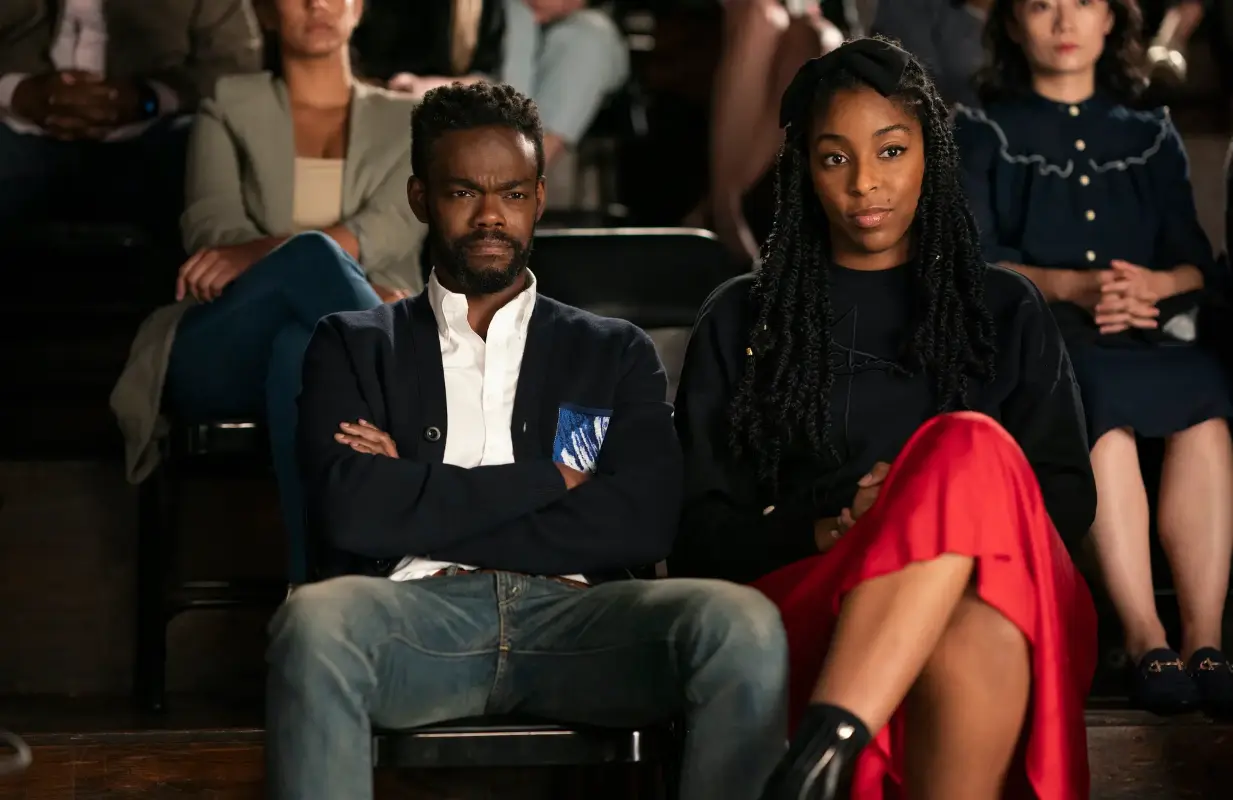Love Life Season 2 Told One of TV's Most Expansive Love Stories
-
 William Jackson Harper and Jessica Williams in Love Life (Photo: HBO Max)
William Jackson Harper and Jessica Williams in Love Life (Photo: HBO Max)HBO Max’s Love Life is one of dozens of shows tossed to the wayside in the recently completed Warner Bros. Discovery merger, but it may be the greatest loss. Created by Sam Boyd, the anthology series premiered in May 2020; over the course of two seasons, it followed multiple protagonists, chronicling their respective journeys from first love to marriage. Anna Kendrick led the first season as Darby Carter, a twentysomething New Yorker who finds her true love in Grant (Kingsley Ben-Adir).
For Season 2, Boyd brought on writer and co-executive producer Rachelle Williams as the focus shifted to Marcus Watkins (William Jackson Harper), a married book editor at a moderately-sized publishing house. We soon find out that the seemingly happy life that Marcus has curated for himself is slowly suffocating him — he is in the midst of an existential crisis.
What makes Season 2 unique is its nuanced exploration of a millennial Black man navigating multiple identities while trying to maintain his core authentic self. To the typical outsider, Marcus checks all the boxes for a middle-class Black man: college educated, intelligent, respectable job, and married. But it isn’t until he meets Mia (Jessica Williams) at a wedding reception that Marcus starts to question his life choices. Mia is beautiful, witty, intelligent, and Marcus is drawn to her immediately. When Marcus points out his wife Emily (who is White) to Mia, she smiles knowingly and says “That makes sense.” Marcus, while confused by Mia’s statement, nonetheless exchanges contact information with her, sending her a draft of a science fiction novel he’s trying to get published.Mia serves as a catalyst of sorts for Marcus as he starts to re-examine his marriage and career. Season 2 offers a truthful examination of being a Black creative in dominant White spaces. When Marcus tries to sign an up-and-coming Black author, he’s accused of trying to whitewash his work. Later that evening, Marcus recounts the meeting to his wife, perturbed by the questioning of his Blackness — in an attempt to comfort him, Emily compares Marcus to LeVar Burton and Barack Obama, which makes him start to feel his wife has a rather limited scope of Black masculinity.
Marcus and Mia’s friendly text exchange soon turns into something much deeper, and the writers deftly show the dangers and intricacies of emotional infidelity. When Emily spies a text exchange between Marcus and Mia about “ugly white babies,” their relationship comes to an immediate and painful conclusion. Marcus must now face life as a now divorced man in New York.
As much as Love Life is about the love story of Marcus and Mia, it is also about familial and platonic love. Throughout the season we are introduced to Marcus’ friends and families. Through these relationships, Marcus faces some uncomfortable truths about himself and how he is challenged in his growth as a man and as a romantic partner. This is illustrated so beautifully in Marcus’ friendship with Yogi (Chris Powell), who holds space for Marcus but has no problem calling out his f*ckboi ways. There’s something powerful in seeing two Black men in a healthy friendship, unafraid to hold each other accountable.
Just as important, Love Life is careful not to reduce Mia to the Manic Pixie Dream Girl trope. While she is the object of Marcus’ desire, she isn’t robbed of her complexity and humanity. Mia has her own flaws and insecurities, as witnessed in Episode 7 when she visits her mother and has to confront her own childhood trauma from her parents’s breakup, which activates a cycle of self-sabotage that affects her new romance with Marcus.
The mistakes Mia and Marcus make are painful to witness, but each character is given grace and empathy to explore and grow. By the time Mia and Marcus reconnect, their reconciliation feels earned. Mia and Marcus aren’t together just because of their race — they are soul mates in all the ways that matter. By the final episode, we witness their emotional growth in how they love and support each other.
As of the time of this writing, Love Life is no longer on HBO Max (though you can purchase seasons through YouTube and Prime Video). The anthology series may yet find new life — Lionsgate, which co-produced the show, retains the rights to shop it elsewhere. In the meantime, the first two seasons could end up on a FAST (Free Ad-Supported Streaming TV Service) platform, where new viewers can discover their joys. The show's cancellation is a loss for the creatives involved but also for viewers, who will be deprived of such a tender portrait of Black love. Black Lives Matter isn’t just limited to trauma and death, but our fight to live and love freely. Love Life Season 2 gave us space to be perfectly imperfect.
Rebecca Theodore-Vachon is a tv and film critic whose work has been featured in Harpers Bazaar, Shondaland Magazine and Indiewire. Follow her on Twitter at FilmFatale_NYC.
TOPICS: Love Life, HBO Max, Jessica Williams, Sam Boyd, William Jackson Harper